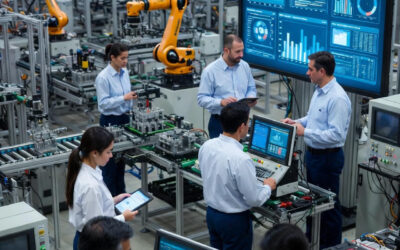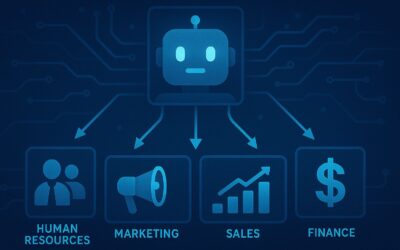The factory floor has always been about making decisions—thousands of them every hour. Which machine needs maintenance? Should we adjust production schedules? Is that quality variance within acceptable limits?
For decades, these decisions relied on human expertise and gut instinct. Today, smart manufacturers are deploying AI agents that transform raw data streams into intelligent, autonomous decisions that drive competitive advantage.
But here’s what most Industry 4.0 discussions miss: AI agents aren’t about replacing human decision-making. They’re about amplifying it, handling the routine decisions so your experts can focus on strategic ones that truly move the needle.
The Evolution: From Data Collection to Intelligent Action
We’ve moved beyond the era of simply collecting data. Today’s leading manufacturers have realized that IoT sensors and data lakes are just the foundation. The real transformation happens when AI agents turn that data into autonomous, intelligent actions.
Consider this progression:
Yesterday: A sensor detected unusual vibration. An alert fires. Someone investigates hours later.
Today: An AI agent detects the vibration pattern, cross-references it with maintenance history, checks production schedules, automatically schedules maintenance during the next changeover, orders necessary parts, and notifies the maintenance team with a detailed action plan.
That’s the power of AI agents—they don’t just alert, they act.
Understanding AI Agents in Manufacturing
AI agents are autonomous systems that perceive their environment, make decisions, and take actions to achieve specific goals. In manufacturing, they operate across three critical layers:
1. Perception Layer
AI agents continuously monitor data streams from:
- IoT sensors on equipment
- Quality inspection systems
- ERP and MES platforms
- Supply chain signals
- Energy management systems
2. Decision Layer
Using machine learning models trained on your specific operations, agents:
- Identify patterns humans might miss
- Predict future states and outcomes
- Evaluate multiple scenarios simultaneously
- Make decisions based on complex trade-offs
3. Action Layer
Most critically, AI agents don’t just recommend—they execute:
- Adjust machine parameters in real-time
- Trigger maintenance workflows
- Reorder inventory
- Reroute production schedules
- Generate compliance documentation
The Three Game-Changing Applications
Based on real-world implementations across smart manufacturing facilities, three AI agent applications consistently deliver transformative results:
1. Demand Forecasting & Inventory Management
The Challenge: Traditional forecasting treats each SKU in isolation, missing the complex relationships between products, market conditions, and production capacity.
The AI Agent Solution: Modern AI agents unify data from ERP, MES, and market signals to predict demand at the SKU level while automatically optimizing reorder points. These agents don’t just forecast—they act on those predictions.
2. Predictive Maintenance & Downtime Prevention
The Challenge: OEM maintenance schedules assume average operating conditions. But your 200-hour maintenance interval might need to be 150 hours during heavy production runs or could stretch to 300 hours during lighter periods.
The AI Agent Solution: Instead of following rigid schedules, AI agents analyze actual equipment conditions, usage patterns, and production demands to predict optimal maintenance windows. They don’t just predict failure—they prevent it.
Real-World Impact: Manufacturers using AI-driven predictive maintenance report 50% reduction in unplanned downtime and 25% extension in equipment life. More importantly, maintenance happens when it’s least disruptive to production.
3. Real-Time Quality & Compliance Monitoring
The Challenge: Traditional quality control relies on sampling—testing one unit per thousand. But in advanced manufacturing, especially with 3D printing and custom production, every part is unique. How do you ensure quality when you can’t destroy-test every item?
The AI Agent Solution: AI agents provide continuous, non-destructive quality validation by analyzing production parameters in real-time. They ensure “as-built” matches “as-designed” for every single unit.
The Multiplication Effect: When AI Agents Work Together
The real magic happens when these AI agents collaborate. Imagine:
- Your demand forecasting agent predicts a spike in orders
- It communicates with the maintenance agent to ensure equipment reliability
- The quality agent adjusts inspection parameters for the increased volume
- Inventory agents ensure raw materials arrive just in time
- Energy management agents optimize power usage during peak production
This orchestration—what we call the AI Control Tower approach—transforms individual improvements into exponential competitive advantage.
Building Your AI Agent Ecosystem: Practical Steps
Start with Value, Not Technology
Don’t deploy AI agents because they’re cutting-edge. Deploy them where they’ll drive measurable business impact. The Theory of Constraints still applies: enhance your bottleneck first.
Ensure Data Quality
AI agents are only as good as the data they consume. Following the medallion architecture (bronze → silver → gold) ensures your agents make decisions based on clean, reliable information.
Define Clear Boundaries
AI agents need well-defined scopes of action. Start with recommendations, move to supervised actions, then graduate to autonomous operation as trust builds.
Measure and Iterate
Track specific KPIs for each agent:
- Forecast accuracy rates
- Maintenance prediction success
- Quality improvement metrics
- Overall equipment effectiveness (OEE)
Scale Strategically
Once an AI agent proves its value in one area, replicate the pattern elsewhere. Success compounds as agents learn to work together.
Common Pitfalls to Avoid
The “Skynet Syndrome”: Trying to automate everything at once. Start small, prove value, then expand.
The Data Swamp: Collecting data without purpose. Every data point should tie to a specific decision or action.
The Black Box Problem: Deploying AI agents without explainability. Your team needs to understand and trust the decisions being made.
The Integration Island: Building AI agents that don’t connect with existing systems. Integration is crucial for real-world impact.
The Competitive Reality
While 85% of manufacturers still operate in the “data desert,” the leaders are racing ahead with AI agent deployments. They’re not just collecting data—they’re weaponizing it through intelligent automation.
The gap between AI-enabled manufacturers and traditional ones is widening daily. Every moment of delay means:
- Competitors gaining efficiency advantages
- Customers expecting capabilities you can’t deliver
- Talent choosing employers with cutting-edge technology
- Margins eroding from operational inefficiencies
Your Next Steps: From Concept to Implementation
The journey from data to decisions doesn’t require a massive transformation. It requires strategic focus on high-value use cases where AI agents can deliver immediate impact.
For manufacturers ready to deploy AI agents but unsure where to start, we’ve developed a comprehensive guide based on hundreds of successful implementations.
Download our free guide: “Top 3 AI Use Cases for Smart Manufacturing Plants” to discover:
✓ Detailed implementation blueprints for demand forecasting, predictive maintenance, and quality monitoring
✓ Technical requirements and integration strategies
✓ Real-world case studies with measurable results
✓ Step-by-step deployment roadmaps ✓ Specific metrics to track success
[Download the Guide Now] and join the 15% of manufacturers who are defining the future of Industry 4.0.
The Decision Point
The question isn’t whether AI agents will transform manufacturing—they already are. The question is whether your factory will be giving the orders or taking them.
Smart manufacturers aren’t waiting for perfect solutions. They’re starting with focused AI agent deployments that deliver immediate value while building toward a fully autonomous future.
The tools exist. The playbook is proven. The competitive advantage is waiting.
Will you remain in the 85% still operating in the data desert? Or will you join the leaders turning data into decisions—and decisions into dominance?
The future of manufacturing isn’t about collecting more data. It’s about making better decisions, faster, continuously, and autonomously. AI agents are the bridge from where you are to where you need to be.
Start building that bridge today.
Based on real-world Industry 4.0 implementations and smart manufacturing best practices. Results vary based on current systems, data quality, and implementation approach.




